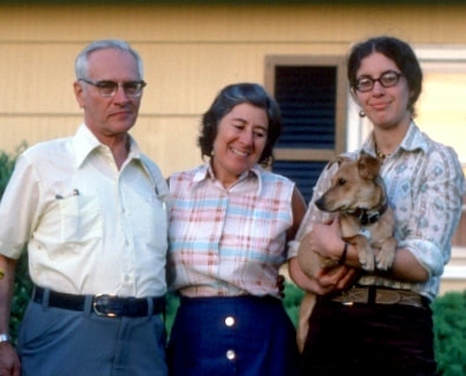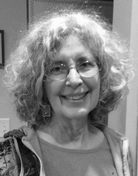Later in the week, I mentioned to my sister Leslie that it felt very odd to be going about my business as usual, when what I really wanted to do was shout, "Hey, World, stop! Something's missing! Someone's gone!" Leslie replied that her response to this dilemma had been to listen again to an oral history interview I'd conducted with our father in 1979. I thought that was a wise suggestion, and over the next few days my husband Ovide and I spent our dinner hour doing the same thing.
I expected hearing my father's voice to be therapeutic because it would give me an opportunity to reflect on him and his life as I felt the need to do in the immediate aftermath of his death. It did that, but it also turned out to be therapeutic in a way I didn't anticipate: It took me back beyond those last terrible two or three years of watching the tragedy of a man with over twenty patents to his name forget how to use his computer and unable to work his answering machine and brought back a larger perspective on his life as a whole.
I had recently completed a two-year stint as editor of a grant-funded oral history project, so I not only recognized the importance of seizing the opportunity but also had a pretty good idea of how to go about conducting such an interview. I prepared a well-elaborated "interview schedule," starting with close-ended questions that were easy to answer (what was your mother's name? when were you born? etc.) so that he would be relaxed by the time I got to the tougher and more thought-provoking questions. I took along two portable tape recorders and mikes (to ensure a backup if either failed) and plenty of pre-labeled audiocassettes. When I arrived at his home, I identified a couple of comfortable chairs in his living room, where over the course of the three days I had set aside for this project, October 2, 3, and 4, we talked for more than five hours, limiting our sessions to a couple of hours apiece to avoid tiring either him or myself.
Any fears I might have had about persuading him to open up proved unfounded. Although he always professed to remember little about his childhood, over the course of the interview I was able to elicit many anecdotes I had never heard and details about his past of which I was only vaguely aware. I think that like me, he had prepared for the interview and spent some time reflecting on what made him the man he was - formative experiences, the importance of friendships and of mentors in his life, his hard-won education at highly selective institutions, his long affiliation with the Unitarians, the development of his career-building skills, and of course his family commitments. In all, we covered the entire sweep of his life, starting with his parents and their roots and ending with a retrospective on his career as he started looking forward to a new life stage. My post About My Father, as well as many other entries to this blog, draws heavily on this material.
In the half-dozen audiocassettes that resulted from this effort, my family has something more precious than anything else he could have left to us.

From the several hours of material I'd gathered, I chose a brief segment about his proudest achievement, his participation in Project Diana. I particularly liked this excerpt because I felt it captured the pride he took in this accomplishment, his fundamental humility, his keen intelligence, his dry sense of humor - and perhaps above all, his gentleness. A transcript of this passage appears elsewhere on this site.

 RSS Feed
RSS Feed